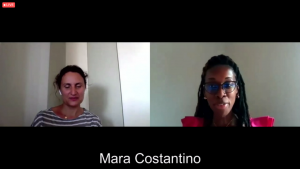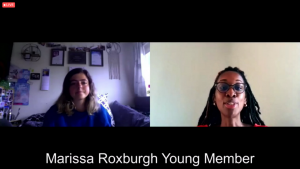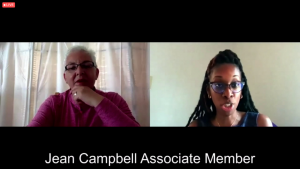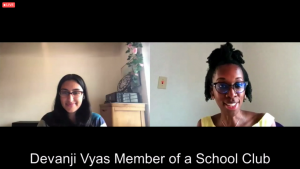Blog by Jane Flint Bridgewater, SI Stourbridge and District
I was pleased to see Membership a recurrent focus during the Conference, as we should all be thinking at all times of how much women who join us in our Programme Action really belong in Soroptimist International. Yesterday’s session on Recruitment was well received in my region. Today, SI Membership Director Chevonne Agana was joined in interviews with four Soroptimists exemplifying different types of Club and Membership: Mara Costantino of the January 2021 chartered eClub of Milan; Marissa Roxburgh of SI Paisley, who became a Soroptimist at the age of just 17; Jean Campbell, who after 22 years of full membership became an Associate Member in 2019, just as active for the Soroptimist agenda, but home based as a carer; and last but not least Devanji Vyas, who having realised her feminist path aged 10, went on to start a School Club.
 Mara described the interesting blend of legacy and innovation as leadership academy attendees started an experimental network acting as Soroptimist apprentices as they self empowered with online webinars in public speaking, team building, preparing material for school exams. Motivation of the younger women was maintained by exploring work:life balance with senior Soroptimists, ‘matching and mentoring’. A creative approach to virtual Programme Action with invention of a digital school diary with QR codes covering diversity, sustainability, violence against women, and period poverty was adopted, with task oriented committees, and a role for everyone.
Mara described the interesting blend of legacy and innovation as leadership academy attendees started an experimental network acting as Soroptimist apprentices as they self empowered with online webinars in public speaking, team building, preparing material for school exams. Motivation of the younger women was maintained by exploring work:life balance with senior Soroptimists, ‘matching and mentoring’. A creative approach to virtual Programme Action with invention of a digital school diary with QR codes covering diversity, sustainability, violence against women, and period poverty was adopted, with task oriented committees, and a role for everyone.
 Marissa, now 20, used to be taken along to Soroptimists by her aunt, and joined some projects alongside her homework. She found that she enjoyed volunteering and helping others, and always learned something from speaker meetings, a different learning experience to conventional university. She very much enjoyed being at the live Bournemouth Conference. When asked by Chevonne what she would recommend to say to young women possibly interested in Soroptimism, Marissa emphasised the different work done at regional, national and global level, and our vital link to the UN.
Marissa, now 20, used to be taken along to Soroptimists by her aunt, and joined some projects alongside her homework. She found that she enjoyed volunteering and helping others, and always learned something from speaker meetings, a different learning experience to conventional university. She very much enjoyed being at the live Bournemouth Conference. When asked by Chevonne what she would recommend to say to young women possibly interested in Soroptimism, Marissa emphasised the different work done at regional, national and global level, and our vital link to the UN.
 Jean spoke of the benefits of Associate Membership for time limited women with a social conscience, who can focus on various recycling activities and local shop based awareness raising, albeit with influence at all levels including the international, without spending money travelling to meetings. She collects bras and pants for Africa, lightly used items for regional starter packs, warm clothes for homeless charities, recycles blister packs through Terracycle, and has ‘oranged’ her local town, and still completes PA database forms! Chevonne confirmed the strategy to turn Associate Membership outwards to attract busier women.
Jean spoke of the benefits of Associate Membership for time limited women with a social conscience, who can focus on various recycling activities and local shop based awareness raising, albeit with influence at all levels including the international, without spending money travelling to meetings. She collects bras and pants for Africa, lightly used items for regional starter packs, warm clothes for homeless charities, recycles blister packs through Terracycle, and has ‘oranged’ her local town, and still completes PA database forms! Chevonne confirmed the strategy to turn Associate Membership outwards to attract busier women.
 Devanji inspirationally described asking herself at the age of 10 what is the purpose of life, and realising that to be useful, honourable, compassionate and make some difference – not just to be happy – is her goal. She decided to be a feminist, and encouraged by her Soroptimist neighbour, she prepared an essay and school presentation on the subject. Partnering with local Soroptimists, her presentation to school years and societies resulted in a School Club engaging in fundraising activities (bake sales, walks, online crowdfunding, virtual quiz) and protests. Low income families were helped during the pandemic, but help was also given to sex trafficked girls. Devanji has quickly come to appreciate that women should be involved in creating policy affecting us all and therefore in leadership activity. When Chevonne asked her what she would say to other girls to engage them, Devanji answered: “I care – I want to make a difference – to make sure all daughters and children have equal opportunities, and there are no gender stereotypes. I invite others to step forward, avoid evil, and make a difference.”
Devanji inspirationally described asking herself at the age of 10 what is the purpose of life, and realising that to be useful, honourable, compassionate and make some difference – not just to be happy – is her goal. She decided to be a feminist, and encouraged by her Soroptimist neighbour, she prepared an essay and school presentation on the subject. Partnering with local Soroptimists, her presentation to school years and societies resulted in a School Club engaging in fundraising activities (bake sales, walks, online crowdfunding, virtual quiz) and protests. Low income families were helped during the pandemic, but help was also given to sex trafficked girls. Devanji has quickly come to appreciate that women should be involved in creating policy affecting us all and therefore in leadership activity. When Chevonne asked her what she would say to other girls to engage them, Devanji answered: “I care – I want to make a difference – to make sure all daughters and children have equal opportunities, and there are no gender stereotypes. I invite others to step forward, avoid evil, and make a difference.”
An encouraging and inspiring interview set which complements the May Membership Month videos we all put together in our regions! While we work to build up our full membership, we must recognise the need to be sensitive to individual pressures as well as potential talent, and ensure we lose no opportunity to make the best of what women are prepared to offer our movement and organisation. Our agenda has now become mainstream, our aspirations for girls and women supported by the majority. It is our challenge to find and recognise those who naturally belong to Soroptimism, and ensure we can mould our 100 year mature organisation to embrace and develop their talent to purpose.

